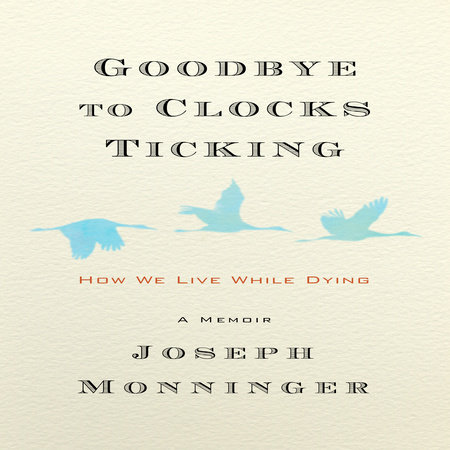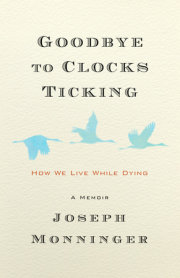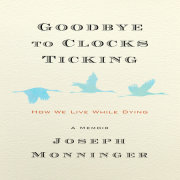I’m dying.
We’re all dying, of course. Everyone who is born begins to die the moment after they gulp air and cry out. Talking about dying is an intellectually safe game to play. We can talk about death, about how we would behave in this or that crisis, and then we can spin confidently back to whatever we were doing a moment before and reassure ourselves that we are not there yet.
Not ready to die. Too young. Too strong. Not our turn.
My train — a hackneyed cliché, but it
is a train, because if we listen we can hear it coming toward us — arrived on an afternoon in May 2021, three days after I retired.
Three days.
That’s not a joke or a typo. After thirty-two years of teaching college classes, after a ballpark guess of working with six thousand students, after planning for my modest savings to be shepherded correctly, after signing up for Social Security and Medicare, I visited my primary physician to say I had been experiencing shortness of breath for a few weeks. The primary physician put a stethoscope to my back, listened, moved it once or twice, listened some more, and then said, “Let’s get you an X-ray.”
The X-ray, it turns out, was
concerning. The doctor recommended I take a CT scan on my lungs just to make sure nothing strange was afoot. I went to Speare Memorial Hospital in Plymouth, New Hampshire, and had a CT scan, after which the young radiologist asked if I’d ever had surgery on my lungs.
“No,” I answered, “but now you have me concerned.”
“Oh, it’s nothing,” she hurried to reassure me. “It could be anything.”
The train came a little closer.
#
In 2019 I purchased a small cottage in Pembroke, Maine. It was a retired post office, a creaky old building dragged to the site by a former local high school teacher who sold biological materials to commercial school markets. He intended to run a kayaking business out of it, or turn it into a playhouse for his kids. The building was in rough shape, thirteen by twenty feet, but it was approximately fifty yards away from Pennamaquan Bay, a beautiful river estuary that feeds into Cobscook Bay and from there to the Bay of Fundy. The building gave me more pleasure than I had anticipated. It came with two good acres sloping toward the bay. No running water, or electricity. No heat except for a coal stove. In the online world, in the world of Covid, the cottage seemed a refuge. My life partner, Susan, loved the place as much as I did, and we spent lovely days sitting in the sun on the front deck, or hiking to Quoddy Head Point, or watching the lobster boats ply the waters off Roque Bluffs Beach. It was, we promised each other, a place to retire. We walked the grounds and decided where a simple home could go. Given the proximity to the bay, we found it was easy to have a 180-degree view of the water. The old post office could serve as a guest cottage. The plans — the idea of building something, the possibility that I might contribute as a retired man to the carpentry — filled my days with dreams. I watched videos about homesteading, researched outhouses and water cisterns. This was the future I had planned for many years during my working life. Now I had made it. No more school for me. No more classes or expectant faces raised to me to ask a question about the material.
All of that was behind me. Hammer and nails from now on. Carpentry.
I had a shovel in my hand when the call came in from a different radiologist saying she had read my CT scan.
“Can you get back Monday?” she asked.
“I’m seven hours away. Can you tell me what’s going on?”
She put me on hold. I realized later that she was weighing the ethics and legal peril of telling me such compromising information over the phone. She came back on a moment later, apologized for the delay, then with a resolved voice informed me my chest scan had been “concerning” and that I had lung cancer. My primary doctor wanted to see me. I needed to go back to my home in New Hampshire.
“I’m up here on a fishing trip,” I said, which was true. “We’re going out for salmon.”
“Well,” she said.
I hung up a few minutes later after making plans to return the following week. Susan was due in an hour. I used the shovel to move some dirt around on the soggy, springtime driveway. Lung cancer. I had lung cancer. Up until that point at sixty-seven, I took no medications, did not smoke or drink to excess. I hiked frequently around New Hampshire and I usually took a daily walk of at least a half hour. I had monitored my eating as I approached retirement, and now I was twenty pounds lighter, with more maneuverability and energy. I felt good. No, I felt astonishingly good, ready to take on retirement and have fun. Months before my official retirement date, my email filled up with wishes for a happy retirement, for trips to be planned, for building designs.
In less than a week, it was all scotched. The dream of retirement, of ease and tranquility, had disappeared in a single phone call.
This is you, the call reminded me,
not someone else.
And as an old English teacher, I couldn’t help asking—as e. e. cummings had asked about Buffalo Bill—
How do you like your blue-eyed boy, Mr. Death? #
We all know we are dying, but nobody believes it. I had read that line somewhere in the past, but whether it is an accurate quote or not I can’t determine. It’s close enough. Oddly, one of the first thoughts I had after speaking to the radiologist was of “Her First Ball,” a short story by the New Zealand writer Katherine Mansfield. I had taught the story many times but had only come to understand it fully in the past half decade. On its face, the story is simple. A young woman is going to her first ball. She is attending the soiree with her more worldly city cousins and she can barely contain her excitement. The gaslights — the story was published in 1921, although it feels set in the 1890s — quiver with companionable joy. Everything around her intoxicates. She revels at the wonderful slipperiness of the dance floor, at the casual indifference of the men across the hall, at the solid pleasure her female cousins have in depending on their attentive brother. She dances with a partner, glides, swirls, catches her breath, dances again, is in love with the world, the light, the glittering movement. She has never felt so deliriously happy. Then, unexpectedly, an older gentleman appears in order to claim his dance from her tiny dance card. He is in his forties, still single, an attendee of too many social events. He is a veteran of the world, and of these lovely balls, and while he dances with her, capably but without any romance, he suggests that she will soon be one of the old ladies sitting on the stage to watch the youngsters, that the slippery floor will come to be a treacherous pond of bad footing, that she will be eager soon to have the dance finished so that she can return to her quiet bed.
You could argue he is death inserting himself into the fantasies of a young woman; for me, he is her mortality, the knowledge we have of our own ending while, simultaneously, denying it. We must dance with the older man, we must listen to him undermine our pleasant revel, but, equally important, we must forget him and cast him aside when he is finished poaching from our lives. That’s what our young protagonist accomplishes. Her first ball is soured by the older man, and she is disconsolate, but then a younger, handsomer man comes to claim his dance, and in his arms the floor again becomes a miracle of gliding, the lights animated friends, the music divine. She bumps into the older man a few moments later and fails even to recognize him.
A story. That’s all. I wondered why this story had come to mind, but then, just as quickly, I understood. This time, in my predicament, the older gentleman could not be so easily dismissed. This time there would be no continuing dance, no sublimation into a joyful present. The old man remained on the dance card, asking each time the music stopped if I was ready to go again, ready to climb up on the stage with the other old folks and begin counting the minutes until death released us.
We all know that we are dying, but nobody believes it. #
An hour after I had received the news about my bad CT scan, Susan arrived. She had known about the testing, of course, and had deliberately hurried her arrival so that she would be beside me when I received the news. Deep down, she had suspected the worst; so had I. But when she arrived, pulling down the grassy path to the old post office, she was nothing but smiles. Part of her happiness came from seeing me, I hoped, but the other part — the larger part in that moment — was her arrival at the cottage. This building, this land, was our shared dream. Imagine, if you will, a small, shake-sided building with nine enormous windows, brown-roofed, with good, uncompromising lines, a front deck, and, behind it, a view of nothing but water. We were not rich people compared with many others — we have been teachers for most of our lives — and the cottage, sitting where it did, always felt as if we had won something for which we could never have hoped: a house on a hill, with clean sheets on the bed, lupines, harbor seals just off our property, scallop draggers anchored off the shore. Across the bay, Coggins Head was conservation land that would never be developed. Somehow, in this hasty world, we had found our way to this beautiful property, to a place that had arguably the finest night skies on the eastern seacoast. The moon rose out of the water to our east and slid along the neighboring shoreline chasing its reflection.
She rode in and our eyes met and we experienced nothing but happiness. In this mix, in this hollow exhalation of news that had altered my life so dramatically, we looked at each other and smiled, our joy at being back together in this place, our place, enough for the moment, enough for many days.
Copyright © 2023 by Joseph Monninger. All rights reserved. No part of this excerpt may be reproduced or reprinted without permission in writing from the publisher.







